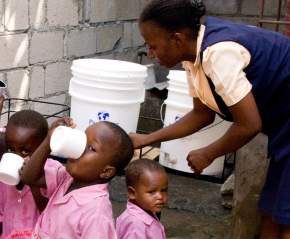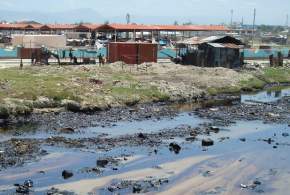The effort to bring clean water to Haiti

The definition of insanity, according to Albert Einstein, is doing the same thing over and over again and expecting it to have different results. If we continue to do what we’ve always done in Haiti, we will always get what we’ve always gotten – not a good return on our investment. A look at Haiti may also provide insights for what our foreign aid policy should consider for any country around the world.
After decades of spending billions of dollars in aid to Haiti, where does that country now stand? It remains the poorest nation in the Western Hemisphere with staggering rates of poverty, unemployment, illiteracy, violence, and infant and maternal mortality; the health of its citizens is among the worst in the world. Meanwhile its Latin neighbors have made significant progress in developing their nations and economies. Report after report has pointed to a wide array of hotly debated reasons for this colossal failure – poor governance, donor conditionality, corruption, U.S. interference, occupations, mandates and economic blockades to name but a few.
The health statistics of Haitians are startlingly bleak. The life expectancy is only forty four years. Eighty percent of the population does not have reliable access to clean water. At any given time, two thirds of the people are ill, largely from preventable water borne illnesses. Three fourths of hospital beds are occupied by patients with water borne illness. It is no wonder, that Haiti remains mired in the cycle of poverty, illiteracy and violence.
How can a nation grow and develop its economy, educate its children, employ its adults and govern itself responsibly and democratically when its people don’t even have a chance to have the most basic of needs – clean water. Imagine trying to effectively run an educational system where two thirds of the children are chronically ill and thus frequently absent. Imagine trying to run a profitable business where two thirds of the employees and customers are chronically ill. Imagine trying to effectively govern and lead a people who are chronically ill. The experience of Haiti has clearly shown that it simply cannot be done.

The tragedy is that with the billions of dollars spent in Haiti in the past decades, negligible amounts have been directed at sustainable water programs that will improve the long term health of Haitians. Humanitarian aid addresses an immediate condition but it most often does not result in a sustainable program that will impact the future. Little has been done to improve access to clean water and even less has been done to educate the people on hygiene and the importance of such things like hand washing in order to reduce the transmission of infectious disease. Foreign aid programs need to embrace the vision of directing efforts at the youngest generation of Haitians – its children. For it is only when its children have at least a chance to grow and develop into healthy adults will the tragic cycles in Haiti be broken. Haitian children endure from bad water irreversible and permanent organ damage to the heart, kidneys, liver, bones and lungs, and brain development is severely impaired. Chronic water borne illness weakens the immune system making it difficult to effectively treat other endemic diseases such as malaria, tuberculosis, pneumococcus, meningitis, and HIV/AIDS and leads to malnutrition and starvation.
Consider this: in 2004, $3.5 billion was spent on treating malaria that killed 840,000 children and $10.8 billion was spent on HIV/AIDS that killed 315,000 children; yet only $1.5 billion was spent on interventions to deal with diarrhea caused by bad water which killed 1,800,000 children – the largest killer of children. How do we get the best return on our investment? We need to reconsider investment priorities. Addressing the lack of clean water does so much more than just save lives.
Consider this: in 2004, $3.5 billion was spent on treating malaria that killed 840,000 children and $10.8 billion was spent on HIV/AIDS that killed 315,000 children; yet only $1.5 billion was spent on interventions to deal with diarrhea caused by bad water which killed 1,800,000 children – the largest killer of children.
We should be looking at “sustainable” and “scalable” programs. We must spend more on sustainable projects that will address root causes of the problem. The proverbial truth that it is better to teach people to fish than to give them fish applies equally to sustainable water projects.
Just recently, with just a small amount of money through an agreement with Management Sciences for Health, an USAID contractor, a small private non-profit organization has begun to address these concerns in Haiti with extraordinary results. Pure Water for the World, Inc. (PWW) program focuses on two simple things: 1) teacher training so that they can provide hygiene education to the children; and, 2) providing a clean water system for schools.
Educating Haitians on the causes and prevention of water borne illness is a primary focus of PWW. Drawing from the American social policy of teaching health and safety in schools and then encouraging students to take the message home, PWW has developed an effective program in the schools to educate students on the very simple and easily teachable ways to prevent infectious disease. Armed with this new knowledge, children take these messages into their homes and neighborhoods. This highly successful model has the potential to be life changing for the people of Haiti and changing cycles.
Since August 2008, PWW has provided over 200,000 school children in Cite Soleil, a large slum outside of Port-au-Prince, with safe drinking water and have trained over 1,000 teachers who are teaching hygiene in the classrooms.
PWW has done this by using bio-sand filters that are made in the PWW facility in Port–au-Prince. PWW is not only providing clean water, but we are employing 25 people. Bio sand filters are simple, inexpensive, and highly effective in removing pathogens via sand filtration, eco-responsible, virtually maintenance free.
PWW also has a class room for teaching teachers a hygiene education program to implement into their school curriculum. In order to participate, school officials must sign contracts stating the terms of the program. The schools become a partner with PWW which is a critical element for success. The average price tag of a school is approximately $1,500 – an average cost of less then $6.00 per child. Only money prevents PWW from expanding exponentially.
Despite these fiscal challenges, we are not about to quit. After all, the Haitians have not given up; they are resilient, strong and proud. They deserve help – but the right kind of help. And, we need them to be our friends at least as much as they need us. The political, social, humanitarian, and geographical reasons are obvious. Haiti could easily become an even hotter bed of political and social unrest. What we do need to do is to change the way we help.
We need to save the newest, youngest generation; and we need to realize that it will take at least a generation to turn life around in Haiti. But if we redirect our efforts in support of projects like PWW, someday in the near future the young girls and boys in the slums of Cite Soleil and elsewhere in Haiti will rise from the rubble that is their country and lead their nation into the twenty first century.
Haiti needs another chance. This time let’s do it right. RF
Meub is the Executive Director of Pure Water for the World, Inc., (www.purewaterfortheworld.org.) She previously served as an aide to the late U.S. Senator Robert T. Stafford (R-VT). Her husband is a member of the Forum’s editorial board.




